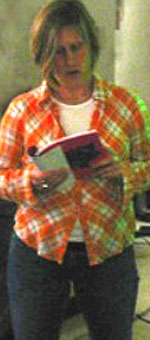
Linda Russo reviews
Chantry
by Elizabeth Treadwell
Chax Press, 2004.
This review is about 3 printed pages long.
In Chantry Elizabeth Treadwell re-inspires old language. Her poems unlock the tongues of musty books (or Penguin reprints). Chantry is a ‘diving into the wreck’ of long-silent dictions and myriad printed pages unread; it is a hymnal to back rooms of used bookstores and long un-touched library shelves everywhere. It is one part elegy and two parts jubilation, with a twist. Chantry is a conference of sirens of all centuries, beginning with the writings of Christine de Pizan. It is hand-made archaeology cum post-feminist treatise in which language has left the site of fragmented-, multiple- or inter-subjectivity; instead, verbal interstices emit pure sonic abrasion. It sings itself and celebrates itself in an excess of devotion (and emotion) true to the American grain – but with the (Whit)mannish sprawling checked at every turn with a careful ruffle.
Formally, Treadwell’s pages have an heterogenous quality. There is much visuo-poetic code-switching from page to page and within a page, where left-justified, long-lined blocks of text abut shorter prose-poemish pieces abut prosey blocks interrupted by single words abut the more classical-appearing single-stanza poem abut multi-lineated word-bespeckled pages, all with a small measure of font change-up around page 43. In the wake of “The New Sentence” Chantry is the flotsam of The New Wordage, a prose resulting from the coupling of unfaithful couples. That is, poetic etiquette is broken with in an entirely new way that also pays homage to the post-Language disjunction, and, following after Susan Howe in particular, Treadwell recuperates the sound of ourselves with a passion not just for syntax but whole singing phrases and patterns. that exists beyond parataxis. The poems in Chantry remind us not only that we “read” word by word, sentence by sentence, but that “reading” itself is not merely a visual activity – one that compels us to acknowledge lines of text – but an aural activity as well. This realization makes poetic units like line and stanza seem rather arbitrary; the stanza itself is here in fact little more than a relic – the poetry in these poems moves on elsewhere.
Here a stanza appears to be an accident, the result of sound rather abruptly stopping, at the inevitable point of sound-sclerosis, or becoming word. This is particularly true of the second section of “Girlbutler” which reads like a verbal heart-attack, a poem about to expire:
the latter part of the myth, a large
pertaining syllable, a black eye, an able,
active mind, projecting, pointed
piece of metal, an itemized preachy slang,
And “lolabell,” composed of four irregular paragraph-stanzas, is purely roisterous. Its opens thus:
thought a boy apartment, taxicab, no early evening gum necessarily pleasant
historians all night long, give cloister crooked muddy, protect her from,
almost kitchen starts. [… ]
A variation on this theme is encountered in “Handgun,” where continuity across line breaks creates a semantic trajectory:
crematorium of the slightest damn
over there pink stucco menace which
avoided stinks through pale evenings
mixing with handsome deadbeat passwords
Perhaps this bulletish directness is the point, but the staccato of verbiage is inescapable. We are awed not by the power to kill, so to speak, but taken with the “report.”
After such stanzaic capriciousness, coming upon an entirely provincial poetic form – the 16th century villanelle (howbeit unrhymed) – makes sense. In “Girlbutler,” a villanelle under the heading “i. capital cities,” heads off this 11-page poem of 19 somewhat erratic sections. The final stanza:
conjure paperweight contemporary, swans, even some you don’t hear
smile and wave just relaunched the end of history, places and techno
why thunderfish wine
bring on the candy shoppe
Like the remaining sections of the poem, this one is dedicated to the cause of sonic strangeness, of sound gutted from context – aural, historical and semantic– in the creation of the coquettish, anachronistic, remixing that is the signature of this book.
In reading we experience a veritable tour of language-once-used-somewhere-by-someones that says to hell with etymology. A fine example of this occurs in another section of “Girlbutler,” under the heading “xvi. bornapart technoromp,” where we encounter, picking out way through this short stanza, the somewhat contemporary ring of “slump lower superfuzz critique,” the almost quaint din of “diabolicking multiple transitive figurine” and the downright medieval “fair, knife deed withal older angers, musty shadows.” Such admixture is the meat of many of these poems, such that “Leisurely Pile-up,” featuring the line “Basila stalking-horse. Please no more! Jejune persistent assuredly” serves as the flip side of “Christines I-IX” – a serial poem sourcing and imitating rhythmically translations of the writings of Christine de Pizan – which is in fact a piece of handiwork: “This one, Sir, alters toward progeny & lends its toothpaste to retrieve it, but, Sir, you are Real, Sir punished on the narrow… ”
In Chantry, Treadwell practices poem as language technology. We are given to write such singing, the title reminds us; it is our endowment.

Linda Russo
Linda Russo’s book Mirth is due to be published by Chax Press in December 2006. She currently teaches at the University of Oklahoma.